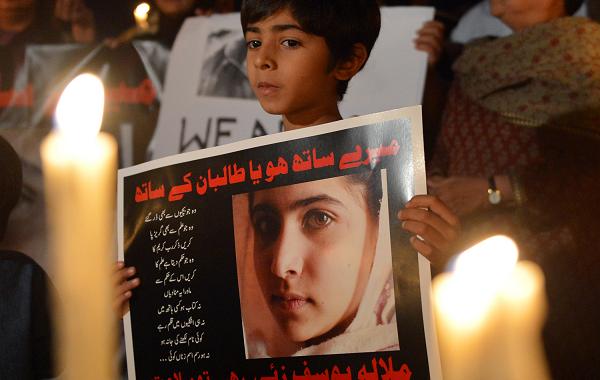
Pakistanis protest against the assassination attempt on Malala Yousafzai in Islamabad on October 11, 2012.© AFP/GettyImages
Malala Yousufzai got on the bus on Tuesday morning to go to school.
With her, were two of her school friends, also bound for Mingora, the
largest town in Pakistan’s Swat District, where their school is located.
It was an ill-fated journey. Before the girls could get to school that
morning, Tehreek-e-Taliban gunmen accosted the bus.
One of the girls, Shazia Razaman confirmed that they were
specifically looking for Malala. She was easy to find, and when they did
find her, they shot her in the head. Hours, later as Pakistanis and the world, watched, aghast and stunned
at yet another act of inhumane violence, the spokesperson for the
Tehreek-e-Taliban, specifically took responsibility for the attack saying:
“She is a Western-minded girl. She always speaks against us. We will target anyone who speaks against the Taliban.”
Malala Yousafzai had been a marked girl since she was only eleven.
In 2007, when the Tehreek-e-Taliban overtook the hill district of Swat,
a picturesque town that used to attract tourists from around the
country, she had kept an Urdu diary for the BBC of life under the Pakistani Taliban.
The diary detailed her frustrations with the Taliban’s edict to shut
down all girls schools; each word of it conveying the helplessness of a
girl eager for an education being thwarted by religious extremism and
political forces beyond her control.
The Pakistani security forces retook the District of Swat
from the Tehreek-e-Taliban in May 2009 and after several months of
follow up operations, schools were finally opened. Malala Yousufzai was ready to go and for her courage the Government of Pakistan honored her with a National Peace Award.
Now she lies in a hospital bed fighting for her life. The attack on
Malala comes in the footsteps of escalating violence against women and
minorities led by the Tehreek-e-Taliban, Pakistan. In recent months,
scores of schools have been bombed, including a school in the towns of Mohmand, Bannu, Charsadda and most recently Nowshera.
The attacks are not the only evidence of the Taliban’s orchestrated
plan to remove women, especially outspoken and activist women from the
public sphere. On July 4, 2012, Farida Afridi
a 25-year-old activist who led an organization that informed women
about their rights was similarly killed in broad daylight for her work
in helping women in her region. She had received many threats in the
past, refusing the Taliban’s premise that being a devout and believing
Muslim woman required sequestering herself in the private sphere. Two
weeks before Farida’s death, the Pakistani singer Ghazala Javed,
who was also from Swat and who sang in the native Pashto language of
the region was also killed late in the night while traveling with her
father in the region.
Together, the attack on Malala Yousufzai, the orchestrated and
continuing bombings of schools, the murders of Farida Afridi and Ghazala
Javed represent the forced eviction of women from the Pakistani public
sphere. While the world pays attention only to the most grisly of the
Taliban’s barbaric attacks; Pakistanis are becoming weary of the staple
of fear, intimidation and brute violence being forced down their throats
by a group whose definition of piety has reduced Islam to only what is
visibly anti-Western.
As the world, now watches the slow progress of a young girl who was
brave enough to refuse to bow to the sinister threats of the Taliban,
hundreds of thousands of schoolgirls in Pakistan watch in thrall as
their future and their desires to go to school stand in the balance.
Malala’s words can give them strength:
“I have rights. I have the right of education. I have the right to play. I have the right to sing. I have the right to talk. I have the right to go to market. I have the right to speak up.”

Nessun commento:
Posta un commento